On July 22, 2025, in Hanoi, the forum on “Promoting Business Participation in the Joint Crediting Mechanism (JCM) Towards Carbon Market Readiness in Vietnam” took place successfully, gathering nearly 200 participants from government agencies, international organizations, and domestic and foreign enterprises.
The forum was co-chaired by Ministry of the Environment of Japan (MOEJ) and Ministry of Agriculture and Environment of Vietnam (MAE), and jointly organized by Overseas Environmental Cooperation Center (OECC), Institute for Global Environmental Strategies (IGES), Article 6 Implementation Partnership (A6IP), and Energy and Environment Consultancy JSC (VNEEC). The forum aimed to provide updates on the current regulatory framework for the carbon market in Vietnam, principles and experiences in implementing JCM projects across potential sectors, and showcase recent Japan–Vietnam projects.
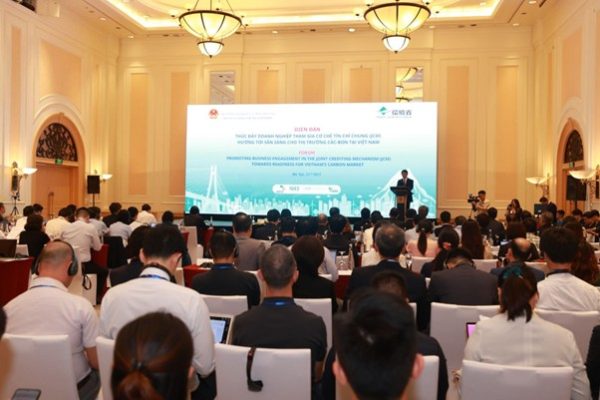
Photo: Forum overview
In the opening remarks, Mr. Tang The Cuong, Director General of the Department of Climate Change (DCC), MAE, reaffirmed Vietnam’s commitment to finalizing the legal and technical infrastructure for launching the domestic carbon market by the end of 2025. He noted that Decree 119/2025/ND-CP, along with a draft decree on carbon credit monitoring and trading, provides a vital legal foundation for this process.
He also emphasized the important role of the JCM — a bilateral initiative between Vietnam and Japan since 2013 — in facilitating the transfer of clean, low-emission technologies to help Vietnam achieve its emission reduction targets by 2030. To date, 15 JCM projects have been approved in Vietnam, generating around 35,000 carbon credits and contributing to the country’s path toward carbon neutrality by 2050 while enhancing the technological capacity of domestic enterprises.
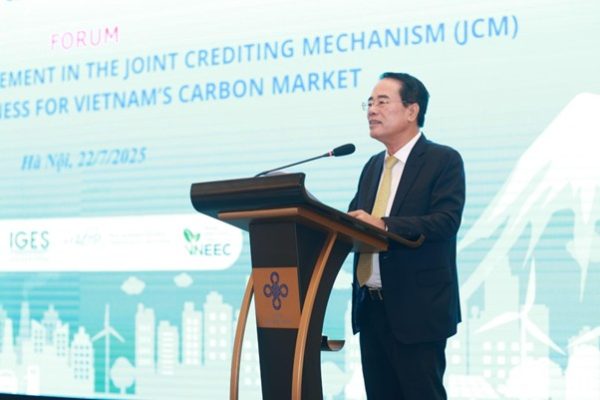
Photo: Mr. Tang The Cuong, Director General of DCC, MAE
H.E. Mr. Ito Naoki, Ambassador of Japan to Vietnam, commended the strong cooperation between MOEJ and MAE. H.E reiterated the commitment of both countries to achieving net-zero emissions by 2050, highlighting the JCM as a key tool to balance emissions reduction with economic growth. H.E further noted Japan’s ongoing support for Vietnam through emission reduction investments and legal development for the carbon market, signaling new opportunities for bilateral collaboration.
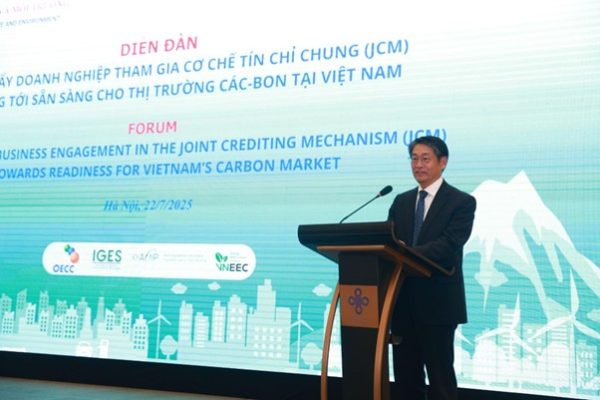
Photo: H.E. Mr. Ito Naoki, Ambassador of Japan to Vietnam
The opening presentations provided an overview of carbon market development in Vietnam and the role of the JCM. Mr. Nguyen Van Minh, Head of the Carbon Market Division at DCC, presented the new legal framework under Decree 119/2025/ND-CP and emphasized the integration of domestic markets with international mechanisms, such as Article 6 of the Paris Agreement. Following that, Mr. Tran Minh Giang, Deputy Head of Financial Market Legislation, Department of Legal Affairs, Ministry of Finance, introduced the draft decree on carbon exchanges and proposed implementation through the existing stock exchange infrastructure to ensure transparency and efficiency.
Representing the Japanese side, Mr. Iino Satoru, Director-General of the Global Environment Bureau, MOEJ, shared that globally over 250 JCM projects have mobilized more than USD 3 billion, including 48 notable projects in Vietnam such as the Hau Giang biomass power plant and Bac Ninh waste-to-energy facility. He noted that JCM rules are being revised to align with Article 6 and introduced the establishment of the Joint Crediting Mechanism Authority (JCMA) in April 2025 to enhance support for partners like Vietnam, particularly in agriculture, energy, and CCUS.
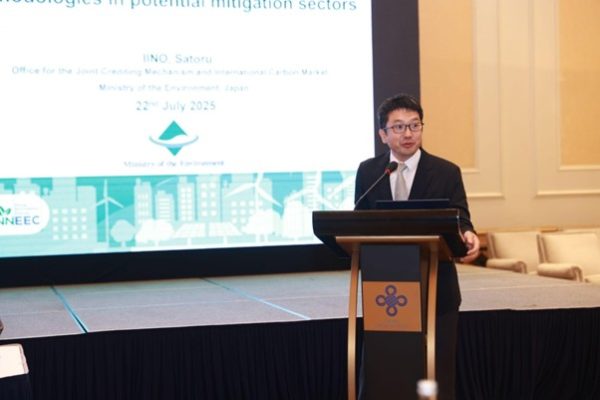
Photo: Mr. Iino Satoru, Director-General, Global Environment Bureau, MOEJ
Enterprise representatives also shared their experiences in developing carbon credit projects across key sectors. Notable cases included: a biomass energy project contributing to energy security and economic development (Erex); an AWD irrigation model generating carbon credits in Vietnam (Green Carbon Co., Ltd.); efforts to commercialize carbon capture and storage (CCS) projects (Japan Organization for Metals and Energy Security); green transition strategies by the Vietnam National Energy and Industrial Group; and Vingroup’s vision for carbon market participation.
The main panel discussion, co-moderated by Mr. Fukuda Koji (MOEJ) and Ms. Dang Thi Hong Hanh (Co-founder and CEO of VNEEC), centered on recommendations and solutions for implementing Article 6.2 of the Paris Agreement in Vietnam. Discussions focused on ensuring environmental integrity, enhancing transparency, and promoting sustainable development in JCM-related projects.
Panelists examined potential sectors for JCM expansion in Vietnam, including renewable energy, agriculture, and waste management, and shared insights from other partner countries to propose locally adapted solutions. The session underscored the importance of linking the domestic carbon market with global systems to facilitate deeper international engagement for Vietnamese businesses in emissions reduction.
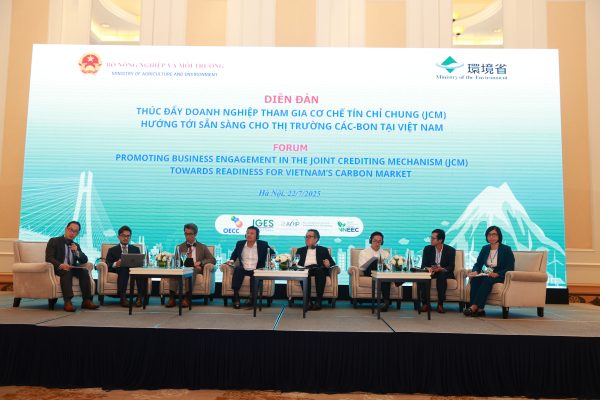
Photo: Panel discussion
The afternoon session began with Mr. Koakutsu Kazuhisa, Director of the A6IP Center, presenting on the updated JCM crediting process, including new rules for authorization, credit allocation, and Article 6 compatibility. This was followed by Mr. Iino Satoru (MOEJ) outlining the principles for JCM methodology development, emphasizing the relevance of sectors such as energy, agriculture, and waste for project development in Vietnam.
The final panel addressed financing approaches, investment solutions for carbon credit projects, and key challenges in carbon project development in Vietnam.

Photo: Experts and delegates at the Forum
The Forum served as a platform for dialogue among government agencies, international partners, and enterprises to exchange experiences and promote private sector engagement in the carbon market. As a co-organizer, VNEEC reaffirmed its commitment to continuing its collaboration with partners in advancing Vietnam’s emission reduction goals.
2,148 views, 6

Tags:
Bài viết liên quan